Module 12 Help Unit 1 What should we do before help arrives ? 课件36张PPT
文档属性
| 名称 | Module 12 Help Unit 1 What should we do before help arrives ? 课件36张PPT | 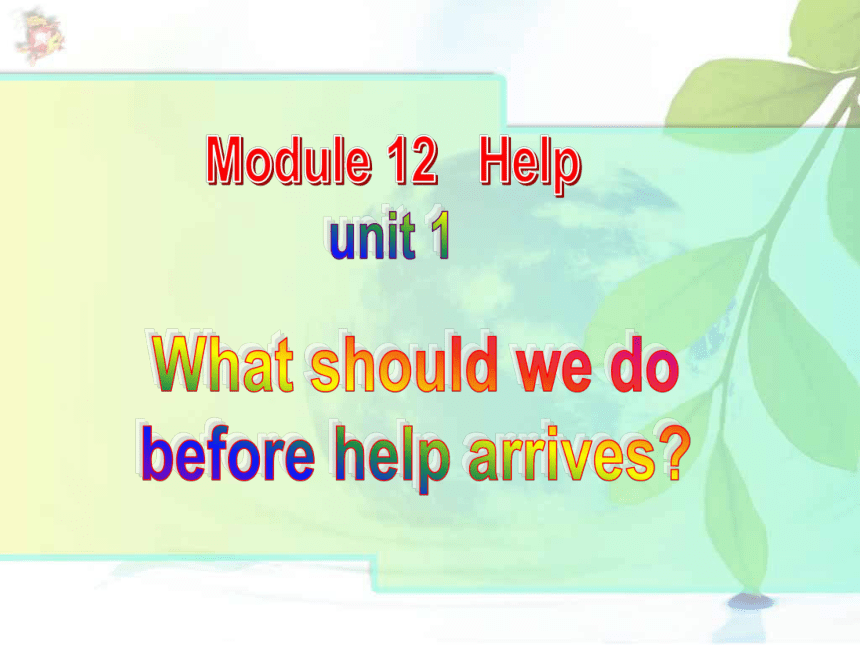 | |
| 格式 | zip | ||
| 文件大小 | 3.0MB | ||
| 资源类型 | 教案 | ||
| 版本资源 | 外研版 | ||
| 科目 | 英语 | ||
| 更新时间 | 2020-07-29 12:53:21 | ||
图片预览

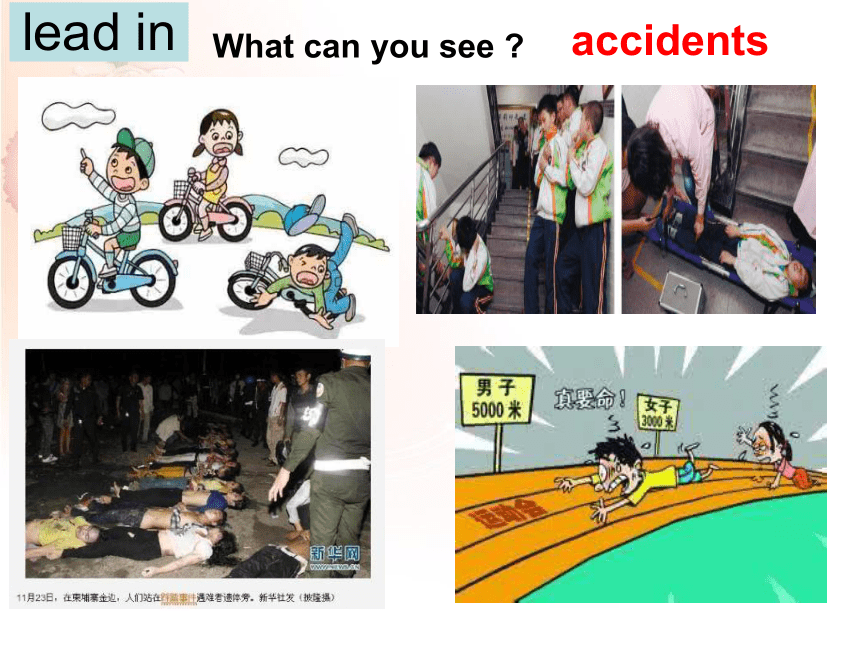
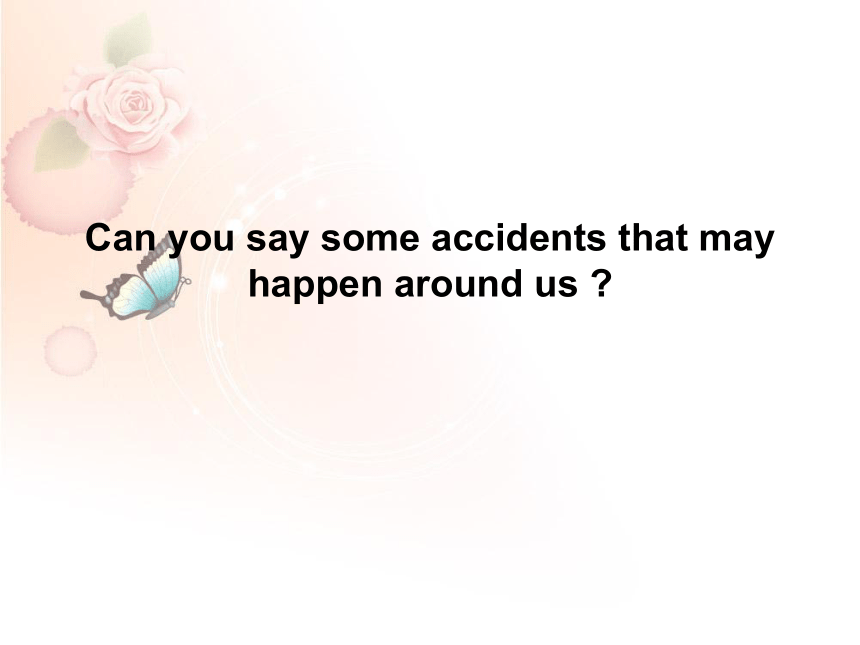
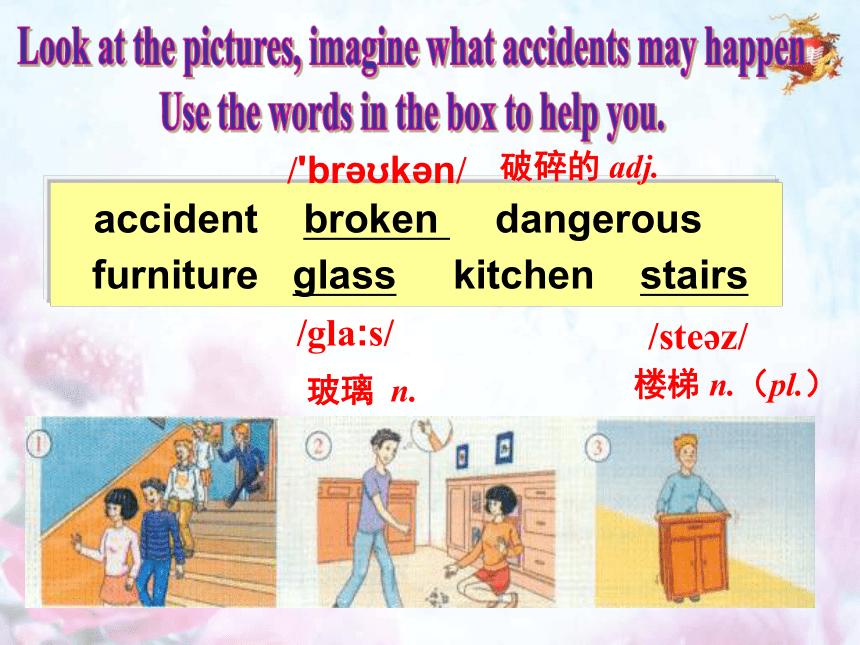

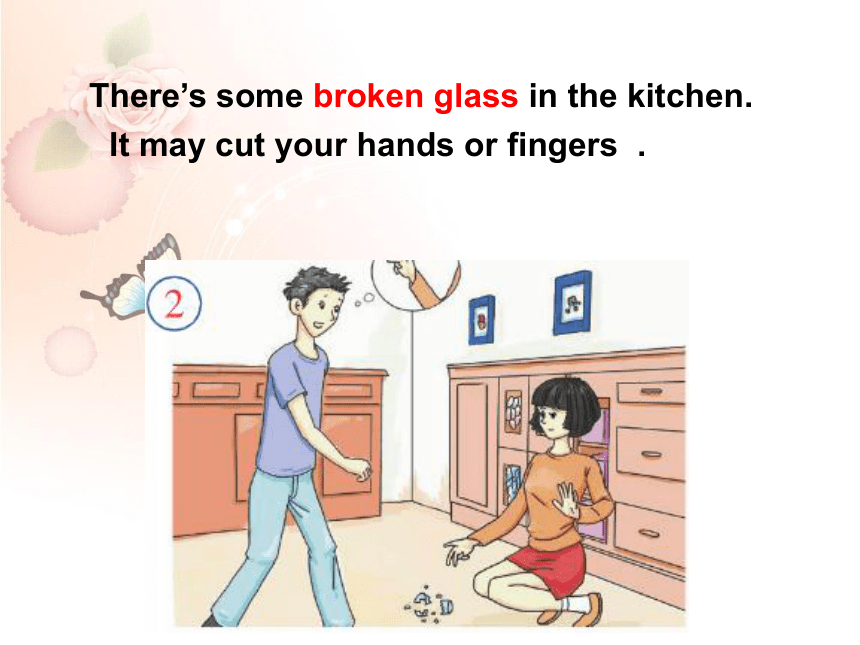

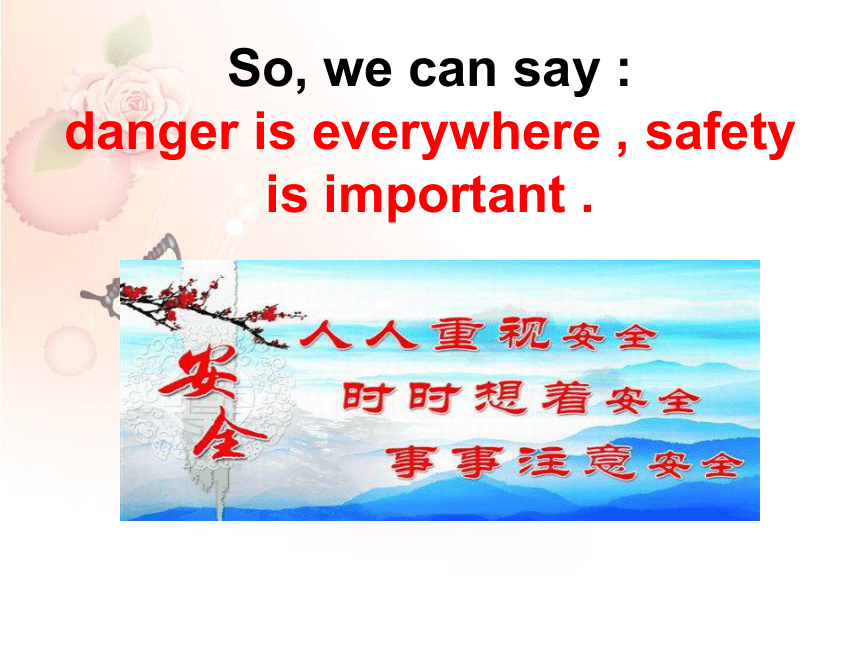
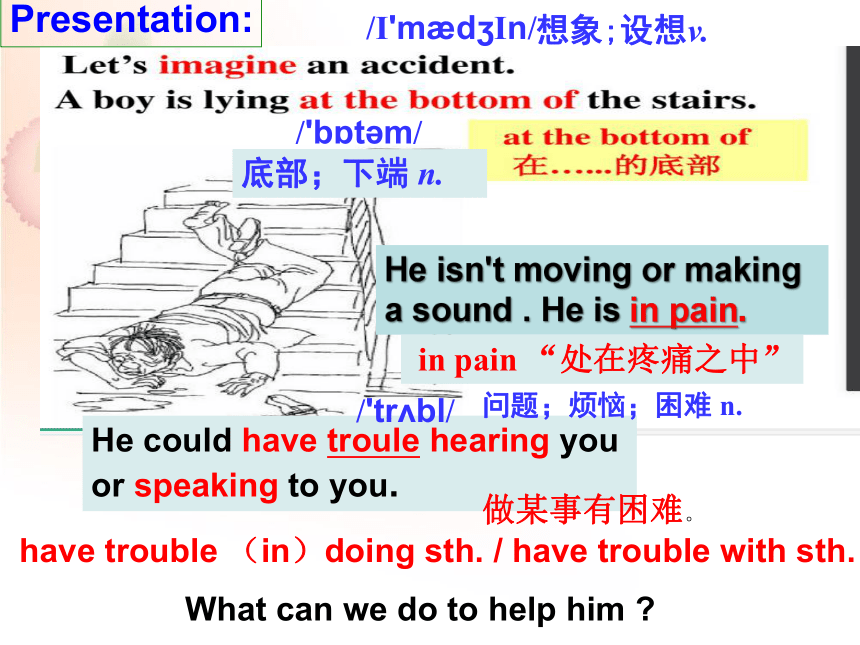
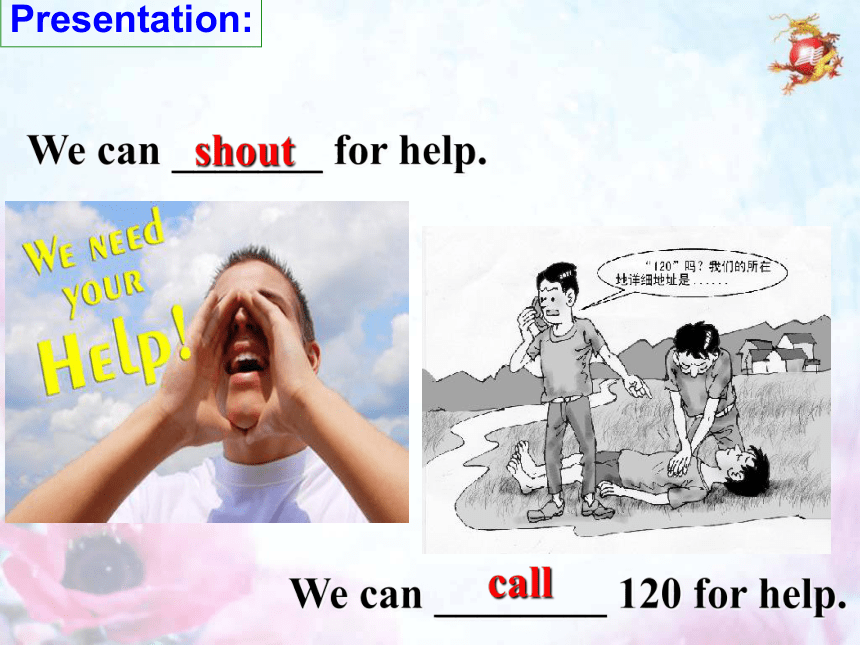

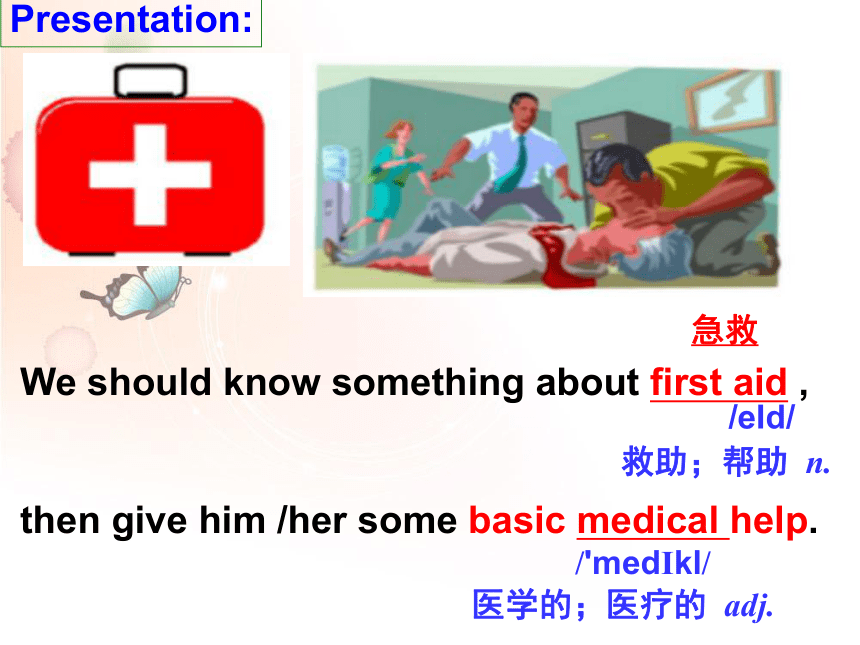
文档简介
(共36张PPT)
lead
in
What
can
you
see
?
accidents
Can
you
say
some
accidents
that
may
happen
around
us
?
accident
broken
dangerous
furniture
glass
kitchen
stairs
/'br??k?n/
破碎的
adj.
/gla:s/
玻璃
n.
/ste?z/
楼梯
n.(pl.)
It’s
dangerous
to
run
down
the
stairs
There’s
some
broken
glass
in
the
kitchen.
It
may
cut
your
hands
or
fingers
.
The
piece
of
furniture
is
heavy
and
the
boy
cannot
lift
it,
it
may
drop
and
hurt
his
foot
.
/lIft/
举起;抬起;提起
v.
电梯
n.
/dr?p/
使落下;投下
v.
So,
we
can
say
:
danger
is
everywhere
,
safety
is
important
.
He
could
have
troule
hearing
you
or
speaking
to
you.
have
trouble
(in)doing
sth.
/
have
trouble
with
sth.
做某事有困难。
He
isn't
moving
or
making
a
sound
.
He
is
in
pain.
What
can
we
do
to
help
him
?
in
pain
“处在疼痛之中”
/I'm?d?In/
/'b?t?m/
想象;设想v.
/'tr?bl/
问题;烦恼;困难
n.
底部;下端
n.
Presentation:
We
can
_______
for
help.
shout
We
can
________
120
for
help.
call
Presentation:
But
what
should
we
do
before
help
arrives?
Make
him
comfortable
Lift
him
up
or
sit
him
on
a
chair
?
That
could
be
harmful
(to
him
)
You
could
drop
him
and
hurt
him
even
more
.
No
lift
up
提起
,
抬起
so
,
don't
lift
him
up
or
sit
him
on
a
chair
/'harm:ful/
有害的
adj.
/dr?p/
使落下;投下
v.
Presentation:
We
should
know
something
about
first
aid
,
then
give
him
/her
some
basic
medical
help.
急救
/eId/
救助;帮助
n.
/'medIkl/
医学的;医疗的
adj.
Presentation:
Make
sure
he's
warm
.
确保,
保证
Cover
him
with
a
coat
.
/'k?v?/
盖;盖上
v.
Presentation:
√
√
×
×
√
Betty
and
Tony
are
talking
about
how
to
give
first
aid
.
What
do
Betty
and
Tony
do
?
Presentation:
Listen
and
complete:
4
Complete
the
passage
bottom
Cover
drop
harmful
imagine
lift
medical
pain
Let’s
(1)
_______
you
see
a
boy
lying
at
the(2)________
of
the
stairs.
What
should
you
do?
Call
for
(3)
________
help
immediately.
Do
not
(4)_____
the
boy
up
and
sit
him
on
a
chair.
This
could
be
(5)
________
for
him!
Even
worse,
you
might
(6)______
him
while
you
are
moving
him!
That
would
cause
a
lot
of
(7)_____.
(8)______
him
with
a
coat
and
make
sure
he
is
warm.
Then
wait
for
the
doctors
to
arrive.
imagine
bottom
medical
lift
harmful
drop
pain
Cover
Ms
James:
This
morning’s
class
is
about
first
aid,
or
giving
someone
basic
medical
help.
Let’s
imagine
an
accident.
A
boy
is
lying
at
the
bottom
of
the
stairs.
He
isn’t
moving
or
making
a
sound.
He
is
in
pain.
What
can
we
do
to
help
him?。
Betty:
First
of
all,
find
out
what’s
wrong
with
him.
Ms
James:
How
do
we
do
that?
Betty:
Ask
him.
Ms
James:
Ok.
But
he
could
have
trouble
hearing
you
or
speaking
to
you.
Lingling:
Shout
for
help?
Call
120?
Ms
James:
Good
idea,
but
what
should
we
do
before
help
arrives?
Tony:
Make
him
comfortable.
Ms
James:
And
how
can
we
do
that?
Tony:
Lift
him
up
and
sit
him
on
a
chair?
Ms
James:
No,
that
could
be
harmful!
You
could
drop
him
and
hurt
him
even
more.
Betty,
you
must
know!
You
did
some
basic
medical
training.
Betty:
Make
sure
he’s
warm.
Cover
him
with
a
coat.
Ms
James:
That’s
such
good
advice
that
you
could
be
a
doctor,
Betty!
Read
and
understand:
That’s
such
good
advice
that
you
could
be
a
doctor,
Betty.
这个建议很好,贝蒂,你可以当医生了。
such
...
that
...
这个句型表达“如此......以至于......”意思,such后面接名词,名词前可以有形容词修饰。
look
and
learn
常用的结构有:
1)
such+a/an+adj+n(可数名词单数)
(+that...);
2)
such+adj+n(不可数名词或可数名词复数)
(+that...)。如:
3.It
is
such
a
tiny
kitchen
that
only
one
person
can
cook
in
it.
如果只有形容词或副词,则要使用
so
...
that
...
这一句型。
e.g.
1.He
was
so
weak
that
he
could
hardly
stand
up.
2.Everything
happened
so
quickly
that
I
hadn’t
time
to
think.
1.It
is
such
sweet
milk
that
we
all
want
to
drink
it.
2.They
are
such
beautiful
flowers
that
I
forget
to
leave.
1.这么香甜的牛奶,我们都想喝。
2.花儿如此的美,以至于我忘了离开。
3.厨房这么小,
以至于只能一个人在里面做饭。
Read
and
list
what
to
do
if
someone
is
hurt
in
an
accident?
1.
Ask
him
what’s
wrong
with
him.
2.
Shout
for
help.
3.
Call
120.
4.
Make
him
comfortable.
5.
Make
sure
he
is
warm.
Cover
him
with
a
coat.
Don't
lift
him
up
and
sit
him
on
a
chair.
詹姆斯女士:今天上午的这节课是关于急救的,
或者给某人基本的医疗帮助。让我们想象一起事故。
一个男孩正躺在楼梯的底部。他没动也没出声。他很疼。
我们能做什么去帮助他?
贝蒂:首先,查明他怎么了
詹姆斯女士:我们如何做呢?
贝蒂:问问他。
詹姆斯女士:很好。但是他有可能很难听到你说话或者和你对话。
玲玲:大声求助(怎么样)?打120?
詹姆斯女士:好主意,但是在救助(人)到来之前我们应该做些什么呢?
托尼:让他舒服些。
詹姆斯女士:那我们能如何做呢?
托尼:把他扶起来让他坐在椅子上?
詹姆斯女士:不,那可能会有伤害!你可能会让他掉下来并且伤得更严重。
贝蒂,你一定知道!你参加过一些基本的医疗培训。
贝蒂:确保他不受凉。用外套盖在他身上。
詹姆斯女士:这个建议非常好,贝蒂,你都可以当医生了!
Student
A:
You
are
a
teacher
of
basic
medical
training.
Student
B:
You
are
a
student
of
basic
medical
training.
--
What
do
you
do
if
someone’s
hurt?
--
Ask
him/her
what
happened
…
考考你
first
aid_________
at
the
bottom
of________
in
pain___________
first
of
all___________
have
trouble
doing
sth.____________
make
sure_________
cover…
with…_____________
lift
...
up____________
急救
在……的底部
处在疼痛之中
首先
确保
做某事有麻烦
用……覆盖……
把......抬起来
exercises
2.
Are
you
still
_______?
1.
A
village
lies
________________
the
hill.
Choose
the
phrases
above
to
complete
the
sentences
:
3.
Did
the
teacher
________who
broke
the
door?
find
out
5.Maria
_________
finding
a
job
and
is
still
staying
at
home.
4.We’ll
have
to
________
the
car
to
get
her
out.
6.
__________you
turn
off
all
the
lights
before
you
go
out.
at
the
bottom
of
in
pain
lift
up
has
trouble
Make
sure
I.
用所给动词的适当形式填空。
1.
Hello,
everyone.
Today’s
topic
is
about
_________
(make)
friends
on
the
Internet.
2.
Don’t
worry.
I
will
do
what
I
can
_________
(help)
you.
3.
I
have
some
trouble
_________
(learn)
English
grammar.
4.
Tim
isn’t
at
home.
He
could
_________
(be)
in
the
playground
now.
5.
Please
_________
(call)
me
when
you
arrive
at
the
station.
making
to
help
in
learning
be
call
II.
用方框中所给短语的适当形式填空。
in
pain;
make
sure;
such…that;
lift
up;
first
of
all
1.
Check
your
test
paper
again
and
_______
there
is
no
spelling
mistakes
in
it.
2.
The
girl
hurt
her
leg
and
couldn’t
move.
Maybe
she
was_________.
3.
Hello,
class.
_________
let
me
introduce
a
new
classmate
to
all
of
you.
4.
It
is
________
fine
weather
________
we
want
to
go
out
for
a
walk
today.
5.
The
boy
is
very
strong.
He
can
________
the
heavy
box.
make
sure
in
pain
First
of
all
such
that
lift
up
重点短语、句型
first
aid
at
the
bottom
of
lift
up
make
sure
What’s
wrong
with
…?
情态动词
must/can/could
表示推测的用法
_______
the
hill,
I
found
a
telephone
and
called
the
police.
A.
At
the
bottom
of
B.
At
the
top
C.
On
the
bottom
D.
On
the
top
of
2.
If
you
find
you
are
in
_____
then
you
should
stop
and
take
a
rest.
A.
pay
B.
happy
C.
happiness
D.
pain
A
D
3.
—
What’s
wrong
_______
you?
—
I’m
feeling
bad.
A.
on
B.
with
C.
of
D.
before
4.
She
will
_____
her
hand
when
she
knows
the
answers.
A.
lift
up
B.
lift
down
C.
lie
up
D.
lie
down
B
A
第二课时
Read
and
find
out
the
Imperative
Sentences(祈使句)
Ms
James:
This
morning’s
class
is
about
first
aid,
or
giving
someone
basic
medical
help.
Let’s
imagine
an
accident.
A
boy
is
lying
at
the
bottom
of
the
stairs.
He
isn’t
moving
or
making
a
sound.
He
is
in
pain.
What
can
we
do
to
help
him?。
Betty:
First
of
all,
find
out
what’s
wrong
with
him.
Ms
James:
How
do
we
do
that?
Betty:
Ask
him.
Ms
James:
Ok.
But
he
could
have
trouble
hearing
you
or
speaking
to
you.
Lingling:
Shout
for
help?
Call
120?
Ms
James:
Good
idea,
but
what
should
we
do
before
help
arrives?
Tony:
Make
him
comfortable.
Ms
James:
And
how
can
we
do
that?
Tony:
Lift
him
up
and
sit
him
on
a
chair?
Ms
James:
No,
that
could
be
harmful!
You
could
drop
him
and
hurt
him
even
more.
Betty,
you
must
know!
You
did
some
basic
medical
training.
Betty:
Make
sure
he’s
warm.
Cover
him
with
a
coat.
Ms
James:
That’s
such
good
advice
that
you
could
be
a
doctor,
Betty!
Read
and
find
out
modal
verbs(情态动词)
Ms
James:
This
morning’s
class
is
about
first
aid,
or
giving
someone
basic
medical
help.
Let’s
imagine
an
accident.
A
boy
is
lying
at
the
bottom
of
the
stairs.
He
isn’t
moving
or
making
a
sound.
He
is
in
pain.
What
can
we
do
to
help
him?。
Betty:
First
of
all,
find
out
what’s
wrong
with
him.
Ms
James:
How
do
we
do
that?
Betty:
Ask
him.
Ms
James:
Ok.
But
he
could
have
trouble
hearing
you
or
speaking
to
you.
Lingling:
Shout
for
help?
Call
120?
Ms
James:
Good
idea,
but
what
should
we
do
before
help
arrives?
Tony:
Make
him
comfortable.
Ms
James:
And
how
can
we
do
that?
Tony:
Lift
him
up
and
sit
him
on
a
chair?
Ms
James:
No,
that
could
be
harmful!
You
could
drop
him
and
hurt
him
even
more.
Betty,
you
must
know!
You
did
some
basic
medical
training.
Betty:
Make
sure
he’s
warm.
Cover
him
with
a
coat.
Ms
James:
That’s
such
good
advice
that
you
could
be
a
doctor,
Betty!
我们学习过情态动词can和could表示“能够”,表示对现在或将来的推测,意为“会,可能”,往往用于否定句和疑问句。用于疑问句时,can比could表示的“可能性”要大;用于否定句时,cannot
(can’t)
表示“不可能”。如:
You
can’t
be
serious!
你不是认真的吧!
could则可用于肯定句、否定句和疑问句。在以下例句中,can和could均表示可能:
He
could
be
in
pain.他可能很疼。
That
could
be
harmful!那可能有害!
Can/Could
this
be
true?这有可能是真的吗?
情态动词must,
can,
could表示推测
情态动词must也可以表示猜测,意思为“一定,准是”,通常只用于肯定句。如课文中的
例子:
Betty,
you
must
know!贝蒂,你肯定知道!
请仔细对比下列一组句子:
Who
sent
the
present?
Can
it
be
your
brother?
是谁送来的礼物啊?会是你哥哥吗?
(询问
可能性)
It
must
be
your
brother.
I
saw
him
in
your
room
just
now.
肯定是你哥哥,我刚才看见他在
你的房间里。
(语气强烈,表示非常肯定)
It
can't
be
my
brother.
He
is
still
in
France.
不可能是我哥哥,他还在法国呢。(表示不可能)
Fill
in
the
blanks
with
the
correct
words
or
expressions
in
brackets.
It’s
very
dangerous.
You
_______(must/mustn’t)
keep
away
from
it!
They
_______(could/mustn’t)
still
win
–
the
game
isn’t
over
yet.
_____________(Move/Don’t
move)
the
boy
if
he’s
broken
his
arm.
________(Keep/Don’t
keep)
the
boy
warm.
He’s
freezing
must
could
Don’t
move
Keep
编写一个关于
first
aid
的对话,字数不少于50字。
lead
in
What
can
you
see
?
accidents
Can
you
say
some
accidents
that
may
happen
around
us
?
accident
broken
dangerous
furniture
glass
kitchen
stairs
/'br??k?n/
破碎的
adj.
/gla:s/
玻璃
n.
/ste?z/
楼梯
n.(pl.)
It’s
dangerous
to
run
down
the
stairs
There’s
some
broken
glass
in
the
kitchen.
It
may
cut
your
hands
or
fingers
.
The
piece
of
furniture
is
heavy
and
the
boy
cannot
lift
it,
it
may
drop
and
hurt
his
foot
.
/lIft/
举起;抬起;提起
v.
电梯
n.
/dr?p/
使落下;投下
v.
So,
we
can
say
:
danger
is
everywhere
,
safety
is
important
.
He
could
have
troule
hearing
you
or
speaking
to
you.
have
trouble
(in)doing
sth.
/
have
trouble
with
sth.
做某事有困难。
He
isn't
moving
or
making
a
sound
.
He
is
in
pain.
What
can
we
do
to
help
him
?
in
pain
“处在疼痛之中”
/I'm?d?In/
/'b?t?m/
想象;设想v.
/'tr?bl/
问题;烦恼;困难
n.
底部;下端
n.
Presentation:
We
can
_______
for
help.
shout
We
can
________
120
for
help.
call
Presentation:
But
what
should
we
do
before
help
arrives?
Make
him
comfortable
Lift
him
up
or
sit
him
on
a
chair
?
That
could
be
harmful
(to
him
)
You
could
drop
him
and
hurt
him
even
more
.
No
lift
up
提起
,
抬起
so
,
don't
lift
him
up
or
sit
him
on
a
chair
/'harm:ful/
有害的
adj.
/dr?p/
使落下;投下
v.
Presentation:
We
should
know
something
about
first
aid
,
then
give
him
/her
some
basic
medical
help.
急救
/eId/
救助;帮助
n.
/'medIkl/
医学的;医疗的
adj.
Presentation:
Make
sure
he's
warm
.
确保,
保证
Cover
him
with
a
coat
.
/'k?v?/
盖;盖上
v.
Presentation:
√
√
×
×
√
Betty
and
Tony
are
talking
about
how
to
give
first
aid
.
What
do
Betty
and
Tony
do
?
Presentation:
Listen
and
complete:
4
Complete
the
passage
bottom
Cover
drop
harmful
imagine
lift
medical
pain
Let’s
(1)
_______
you
see
a
boy
lying
at
the(2)________
of
the
stairs.
What
should
you
do?
Call
for
(3)
________
help
immediately.
Do
not
(4)_____
the
boy
up
and
sit
him
on
a
chair.
This
could
be
(5)
________
for
him!
Even
worse,
you
might
(6)______
him
while
you
are
moving
him!
That
would
cause
a
lot
of
(7)_____.
(8)______
him
with
a
coat
and
make
sure
he
is
warm.
Then
wait
for
the
doctors
to
arrive.
imagine
bottom
medical
lift
harmful
drop
pain
Cover
Ms
James:
This
morning’s
class
is
about
first
aid,
or
giving
someone
basic
medical
help.
Let’s
imagine
an
accident.
A
boy
is
lying
at
the
bottom
of
the
stairs.
He
isn’t
moving
or
making
a
sound.
He
is
in
pain.
What
can
we
do
to
help
him?。
Betty:
First
of
all,
find
out
what’s
wrong
with
him.
Ms
James:
How
do
we
do
that?
Betty:
Ask
him.
Ms
James:
Ok.
But
he
could
have
trouble
hearing
you
or
speaking
to
you.
Lingling:
Shout
for
help?
Call
120?
Ms
James:
Good
idea,
but
what
should
we
do
before
help
arrives?
Tony:
Make
him
comfortable.
Ms
James:
And
how
can
we
do
that?
Tony:
Lift
him
up
and
sit
him
on
a
chair?
Ms
James:
No,
that
could
be
harmful!
You
could
drop
him
and
hurt
him
even
more.
Betty,
you
must
know!
You
did
some
basic
medical
training.
Betty:
Make
sure
he’s
warm.
Cover
him
with
a
coat.
Ms
James:
That’s
such
good
advice
that
you
could
be
a
doctor,
Betty!
Read
and
understand:
That’s
such
good
advice
that
you
could
be
a
doctor,
Betty.
这个建议很好,贝蒂,你可以当医生了。
such
...
that
...
这个句型表达“如此......以至于......”意思,such后面接名词,名词前可以有形容词修饰。
look
and
learn
常用的结构有:
1)
such+a/an+adj+n(可数名词单数)
(+that...);
2)
such+adj+n(不可数名词或可数名词复数)
(+that...)。如:
3.It
is
such
a
tiny
kitchen
that
only
one
person
can
cook
in
it.
如果只有形容词或副词,则要使用
so
...
that
...
这一句型。
e.g.
1.He
was
so
weak
that
he
could
hardly
stand
up.
2.Everything
happened
so
quickly
that
I
hadn’t
time
to
think.
1.It
is
such
sweet
milk
that
we
all
want
to
drink
it.
2.They
are
such
beautiful
flowers
that
I
forget
to
leave.
1.这么香甜的牛奶,我们都想喝。
2.花儿如此的美,以至于我忘了离开。
3.厨房这么小,
以至于只能一个人在里面做饭。
Read
and
list
what
to
do
if
someone
is
hurt
in
an
accident?
1.
Ask
him
what’s
wrong
with
him.
2.
Shout
for
help.
3.
Call
120.
4.
Make
him
comfortable.
5.
Make
sure
he
is
warm.
Cover
him
with
a
coat.
Don't
lift
him
up
and
sit
him
on
a
chair.
詹姆斯女士:今天上午的这节课是关于急救的,
或者给某人基本的医疗帮助。让我们想象一起事故。
一个男孩正躺在楼梯的底部。他没动也没出声。他很疼。
我们能做什么去帮助他?
贝蒂:首先,查明他怎么了
詹姆斯女士:我们如何做呢?
贝蒂:问问他。
詹姆斯女士:很好。但是他有可能很难听到你说话或者和你对话。
玲玲:大声求助(怎么样)?打120?
詹姆斯女士:好主意,但是在救助(人)到来之前我们应该做些什么呢?
托尼:让他舒服些。
詹姆斯女士:那我们能如何做呢?
托尼:把他扶起来让他坐在椅子上?
詹姆斯女士:不,那可能会有伤害!你可能会让他掉下来并且伤得更严重。
贝蒂,你一定知道!你参加过一些基本的医疗培训。
贝蒂:确保他不受凉。用外套盖在他身上。
詹姆斯女士:这个建议非常好,贝蒂,你都可以当医生了!
Student
A:
You
are
a
teacher
of
basic
medical
training.
Student
B:
You
are
a
student
of
basic
medical
training.
--
What
do
you
do
if
someone’s
hurt?
--
Ask
him/her
what
happened
…
考考你
first
aid_________
at
the
bottom
of________
in
pain___________
first
of
all___________
have
trouble
doing
sth.____________
make
sure_________
cover…
with…_____________
lift
...
up____________
急救
在……的底部
处在疼痛之中
首先
确保
做某事有麻烦
用……覆盖……
把......抬起来
exercises
2.
Are
you
still
_______?
1.
A
village
lies
________________
the
hill.
Choose
the
phrases
above
to
complete
the
sentences
:
3.
Did
the
teacher
________who
broke
the
door?
find
out
5.Maria
_________
finding
a
job
and
is
still
staying
at
home.
4.We’ll
have
to
________
the
car
to
get
her
out.
6.
__________you
turn
off
all
the
lights
before
you
go
out.
at
the
bottom
of
in
pain
lift
up
has
trouble
Make
sure
I.
用所给动词的适当形式填空。
1.
Hello,
everyone.
Today’s
topic
is
about
_________
(make)
friends
on
the
Internet.
2.
Don’t
worry.
I
will
do
what
I
can
_________
(help)
you.
3.
I
have
some
trouble
_________
(learn)
English
grammar.
4.
Tim
isn’t
at
home.
He
could
_________
(be)
in
the
playground
now.
5.
Please
_________
(call)
me
when
you
arrive
at
the
station.
making
to
help
in
learning
be
call
II.
用方框中所给短语的适当形式填空。
in
pain;
make
sure;
such…that;
lift
up;
first
of
all
1.
Check
your
test
paper
again
and
_______
there
is
no
spelling
mistakes
in
it.
2.
The
girl
hurt
her
leg
and
couldn’t
move.
Maybe
she
was_________.
3.
Hello,
class.
_________
let
me
introduce
a
new
classmate
to
all
of
you.
4.
It
is
________
fine
weather
________
we
want
to
go
out
for
a
walk
today.
5.
The
boy
is
very
strong.
He
can
________
the
heavy
box.
make
sure
in
pain
First
of
all
such
that
lift
up
重点短语、句型
first
aid
at
the
bottom
of
lift
up
make
sure
What’s
wrong
with
…?
情态动词
must/can/could
表示推测的用法
_______
the
hill,
I
found
a
telephone
and
called
the
police.
A.
At
the
bottom
of
B.
At
the
top
C.
On
the
bottom
D.
On
the
top
of
2.
If
you
find
you
are
in
_____
then
you
should
stop
and
take
a
rest.
A.
pay
B.
happy
C.
happiness
D.
pain
A
D
3.
—
What’s
wrong
_______
you?
—
I’m
feeling
bad.
A.
on
B.
with
C.
of
D.
before
4.
She
will
_____
her
hand
when
she
knows
the
answers.
A.
lift
up
B.
lift
down
C.
lie
up
D.
lie
down
B
A
第二课时
Read
and
find
out
the
Imperative
Sentences(祈使句)
Ms
James:
This
morning’s
class
is
about
first
aid,
or
giving
someone
basic
medical
help.
Let’s
imagine
an
accident.
A
boy
is
lying
at
the
bottom
of
the
stairs.
He
isn’t
moving
or
making
a
sound.
He
is
in
pain.
What
can
we
do
to
help
him?。
Betty:
First
of
all,
find
out
what’s
wrong
with
him.
Ms
James:
How
do
we
do
that?
Betty:
Ask
him.
Ms
James:
Ok.
But
he
could
have
trouble
hearing
you
or
speaking
to
you.
Lingling:
Shout
for
help?
Call
120?
Ms
James:
Good
idea,
but
what
should
we
do
before
help
arrives?
Tony:
Make
him
comfortable.
Ms
James:
And
how
can
we
do
that?
Tony:
Lift
him
up
and
sit
him
on
a
chair?
Ms
James:
No,
that
could
be
harmful!
You
could
drop
him
and
hurt
him
even
more.
Betty,
you
must
know!
You
did
some
basic
medical
training.
Betty:
Make
sure
he’s
warm.
Cover
him
with
a
coat.
Ms
James:
That’s
such
good
advice
that
you
could
be
a
doctor,
Betty!
Read
and
find
out
modal
verbs(情态动词)
Ms
James:
This
morning’s
class
is
about
first
aid,
or
giving
someone
basic
medical
help.
Let’s
imagine
an
accident.
A
boy
is
lying
at
the
bottom
of
the
stairs.
He
isn’t
moving
or
making
a
sound.
He
is
in
pain.
What
can
we
do
to
help
him?。
Betty:
First
of
all,
find
out
what’s
wrong
with
him.
Ms
James:
How
do
we
do
that?
Betty:
Ask
him.
Ms
James:
Ok.
But
he
could
have
trouble
hearing
you
or
speaking
to
you.
Lingling:
Shout
for
help?
Call
120?
Ms
James:
Good
idea,
but
what
should
we
do
before
help
arrives?
Tony:
Make
him
comfortable.
Ms
James:
And
how
can
we
do
that?
Tony:
Lift
him
up
and
sit
him
on
a
chair?
Ms
James:
No,
that
could
be
harmful!
You
could
drop
him
and
hurt
him
even
more.
Betty,
you
must
know!
You
did
some
basic
medical
training.
Betty:
Make
sure
he’s
warm.
Cover
him
with
a
coat.
Ms
James:
That’s
such
good
advice
that
you
could
be
a
doctor,
Betty!
我们学习过情态动词can和could表示“能够”,表示对现在或将来的推测,意为“会,可能”,往往用于否定句和疑问句。用于疑问句时,can比could表示的“可能性”要大;用于否定句时,cannot
(can’t)
表示“不可能”。如:
You
can’t
be
serious!
你不是认真的吧!
could则可用于肯定句、否定句和疑问句。在以下例句中,can和could均表示可能:
He
could
be
in
pain.他可能很疼。
That
could
be
harmful!那可能有害!
Can/Could
this
be
true?这有可能是真的吗?
情态动词must,
can,
could表示推测
情态动词must也可以表示猜测,意思为“一定,准是”,通常只用于肯定句。如课文中的
例子:
Betty,
you
must
know!贝蒂,你肯定知道!
请仔细对比下列一组句子:
Who
sent
the
present?
Can
it
be
your
brother?
是谁送来的礼物啊?会是你哥哥吗?
(询问
可能性)
It
must
be
your
brother.
I
saw
him
in
your
room
just
now.
肯定是你哥哥,我刚才看见他在
你的房间里。
(语气强烈,表示非常肯定)
It
can't
be
my
brother.
He
is
still
in
France.
不可能是我哥哥,他还在法国呢。(表示不可能)
Fill
in
the
blanks
with
the
correct
words
or
expressions
in
brackets.
It’s
very
dangerous.
You
_______(must/mustn’t)
keep
away
from
it!
They
_______(could/mustn’t)
still
win
–
the
game
isn’t
over
yet.
_____________(Move/Don’t
move)
the
boy
if
he’s
broken
his
arm.
________(Keep/Don’t
keep)
the
boy
warm.
He’s
freezing
must
could
Don’t
move
Keep
编写一个关于
first
aid
的对话,字数不少于50字。
同课章节目录
- Module 1 How to learn English
- Unit 1 Let's try to speak English as much as possi
- Unit 2 You should smile at her.
- Unit 3 Language in use .
- Module 2 My home town and my country
- Unit 1 It's taller than many other buildings.
- Unit 2 Cambridge is a beautiful city in the east o
- Unit 3 Language in use .
- Module 3 Sports.
- Unit 1 Nothing is more exciting than playing tenni
- Unit 2 This year we training more carefully.
- Unit 3 Language in use .
- Module 4 Planes, ships and trains .
- Unit 1 He lives the farthest from school.
- Unit 2 What is the best way to travel.
- Unit 3 Language in use .
- Module 5 Lao She Teahouse.
- Unit 1 I wanted to see the Beijing Opera.
- Unit 2 It descibes the changes in Chinese society.
- Unit 3 Language in use .
- Module 6 Animals in danger.
- Unit 1 It allows people to get closer to them .
- Unit 2 The WWF is working hard to save them all.
- Unit 3 Language in use .
- Revision module A
- Module 7 A famous story
- Unit 1 Alice was sitting with her sister by the ri
- Unit 2 She was thinking about her cat.
- Unit 3 Language in use .
- Module 8 Accidents
- Unit 1 While the car were changing to red, a car s
- Unit 2 I was trying to pick it up when it bite me
- Unit 3 Language in use .
- Module 9 Population
- Unit 1 The population of China is about 1.37 billi
- Unit 2 Arnwick was a city with 200,000 people.
- Unit 3 Language in use .
- Module 10 The weathe
- Unit 1 It might snow.
- Unit 2 The weather is fine all year round.
- Unit 3 Language in use .
- Module 11 Way of life
- Unit 1 In China ,we open a gift later.
- Unit 2 In England, you usually drink tea with milk
- Unit 3 Language in use .
- Module 12 Help
- Unit 1 What should we do before help arrives?
- Unit 2 Stay away from windows and heavy furniture.
- Unit 3 Language in use .
- Revision module B
